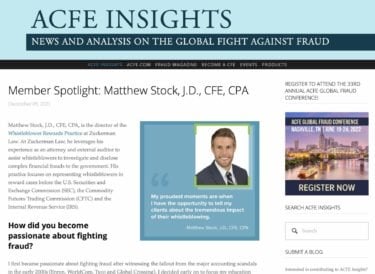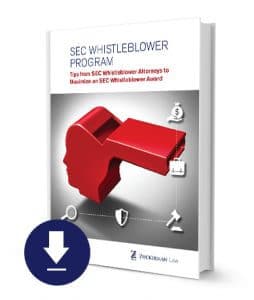
Investment Adviser Fraud Whistleblowing
Under the Dodd-Frank Act, whistleblowers may receive a reward for reporting original information to the U.S. Securities and Exchange Commission (“SEC”) about violations of federal securities laws, including investment adviser fraud. In a recent speech, the director of the SEC Office of Compliance Inspections and Examinations revealed that the agency has increased staffing in the Investment Adviser/Investment Company (“IA/IC”) Examination Program by 20%. This expansion confirms the SEC’s continued focus on investigations and enforcement actions related to investment adviser fraud, such as:
- misleading fee agreements;
- overcharging clients;
- failing to disclose conflicts of interest;
- improper allocation of expenses;
- false advertising of performance; and
- “parking” schemes.
The SEC regulates investment advisers primarily under the Investment Advisers Act of 1940 and the rules adopted under that statute. The SEC frequently initiates enforcement actions for investment advisor violations.
If you have information that may qualify for an SEC whistleblower award, contact the Director of our SEC whistleblower practice at [email protected] or call our leading SEC whistleblower lawyers at (202) 930-5901 or (202) 262-8959. All inquiries are confidential.






In conjunction with our courageous clients, we have helped the SEC halt multi-million dollar investment schemes, expose violations at large publicly traded companies, and return funds to defrauded investors. Read our tips for SEC whistleblowers and Forbes column about the success of the SEC whistleblower program.
Contact us today to find out the strategies that we have successfully employed to secure SEC whistleblower awards for our whistleblower clients.
SEC’s Investment Adviser/Investment Company Examination Program
The director explained, in his speech, that investment advisers are one of the fastest-growing groups of SEC registrants. In the past two years, over 2,000 new advisers have registered, bringing the total number of registered investment advisers to more than 12,000. And unlike broker-dealers, a vast majority of these investment advisers are regulated only by the SEC. As such, the SEC has chosen to be more reliant on FINRA—the self-regulatory organization that shares oversight of the broker-dealer industry with the SEC—and allocate more of its resources to combatting IA/IC fraud.
SEC Investment Adviser Enforcement Actions
Even prior to the reallocation of resources, the SEC aggressively pursued enforcement actions against investment advisers. In the past year, there were 5 notable areas of investment adviser fraud:
Failure to Properly Disclose Fee Arrangements
- Three private equity advisers within The Blackstone Group agreed to pay nearly $39 million to settle charges that they failed to fully inform investors about benefits that they obtained from accelerated monitoring fees and discounts on legal fees.
- Four private equity fund advisers affiliated with Apollo Global Management agreed to a $52.7 million settlement for, among other things, misleading fund investors about fees. Similar to The Blackstone Group’s violation, Apollo and its advisers did not inform its investors about the benefits they received (to the detriment of fund investors) by accelerating the payment of future monitoring fees owed by the funds’ portfolio companies upon the sale or IPO of those companies.
Overcharging Clients
- On May 10, 2017, the SEC announced a $97 million settlement with Barclays Capital for three sets of violations that resulted in clients being overbilled by nearly $50 million. First, according to the SEC’s order, two Barclays advisory programs were charging fees to more than 2,000 clients for due diligence and monitoring of third-party investment strategies when in fact these services were not being performed. Next, Barclay’s collected excess mutual fund sales charges and fees by recommending more expensive share classes when less expensive share classes were available. Finally, Barclay’s overbilled more than 22,000 accounts due to miscalculations and billing errors.
Failure to Disclose Conflicts of Interest
- A New York-based private equity firm, Fenway Partners LLC, and its 4 executives agreed to a $10.2 million settlement for failing to tell their fund clients that they rerouted portfolio company fees to an affiliate and avoided providing the benefits of those fees to the fund clients in the form of management fee offsets. In total, the private equity firm rerouted more than $20 million in payments out of fund assets or portfolio companies to the affiliated entity.
- Three AIG affiliates agreed to pay more than $9.5 million to settle charges for steering fund clients toward more expensive share classes so that the firms could collect more fees. An SEC investigation revealed that the firms generated about $2 million in extra fees by placing clients in share classes that charged fees for marketing and distribution, despite the clients’ being eligible to buy shares in fund classes without those additional charges.
- The SEC alleged in a December 11, 2017 complaint that an investment adviser breached its fiduciary duty to its clients by repeatedly purchasing securities in client accounts that generated undisclosed mark-ups and fees on top of the advisory fees that the clients already paid the adviser to manage their investments. The securities that generated the undisclosed mark-ups were risky and caused substantial losses for clients.
- On August 20, 2018, Merrill Lynch agreed to pay nearly $9 million to settle charges that it failed to disclose a conflict of interest arising out of its own business interests in deciding whether to continue to offer clients products managed by an outside third-party advisory firm. According to the SEC’s order, the conflict of interest arose in Merrill Lynch’s handling of third-party products managed by a U.S. subsidiary of a foreign multinational bank, in which more than 1,500 of Merrill’s retail advisory accounts had invested approximately $575 million.
Charging Avoidable Fees by Recommending Expensive Share Classes
- SunTrust Investment Services, Inc paid $1.1 million to settle charges that it collected at least $1 million in avoidable fees by improperly recommending more expensive share classes of various mutual funds when cheaper shares of the same funds were available. The SEC found that SunTrust breached its fiduciary duty to its advisory clients, made inadequate disclosures that failed to explain certain conflicts of interest and had deficiencies in compliance policies and procedures in connection with its mutual fund share class selection processes.
Improper Allocation of Expenses
- Private equity firm First Reserve Management L.P. negotiated a legal fee discount for work performed on its fund. Despite receiving the discount, First Reserve did not allocate any of it to the funds. First Reserve also failed to adequately inform its fund clients about, among other things, a liability insurance policy that covered First Reserve for risks not entirely arising from management of the funds (where the governing documents provided that the funds would pay only insurance expenses relating to the affairs of the funds). As a result of these violations, First Reserve was required to pay a civil penalty of $3.5 million.
- On May 2, 2017, Calvert Investment Management agreed to pay more than $22 million to settle charges that fund assets were improperly used to pay for marketing and distribution services as well as expenses in excess of annual expense caps.
False Advertising of Performance
- On August 25, 2016, the SEC announced penalties (ranging from $100,000 to a half-million dollars) against 13 investment advisory firms for accepting and negligently relying on claims by an investment marketing firm called F-Squared. Without obtaining sufficient documentation, the advisory firms recommended F-Squared’s investment strategy to their own clients. An SEC enforcement action later revealed that the strategy—which was purportedly based on F-Squared’s real, historical track record—was only back-tested performance that turned out to be substantially inflated. F-Squared was charged $35 million for its part in defrauding investors through false performance advertising.
“Parking” Schemes
- Morgan Stanley Investment Management agreed to pay $8.8 million to settle charges that one of its portfolio managers unlawfully conducted prearranged trading, known as “parking,” that favored certain advisory clients over others. In the scheme, the Morgan Stanley adviser arranged sales of securities to another trader at a predetermined price that would enable the adviser to buy back the positions at a small markup into other accounts advised by Morgan Stanley.
SEC Whistleblower Reward Program
Under the SEC Whistleblower Program, whistleblowers may be eligible for monetary awards when they voluntarily provide the SEC with original information about violations of federal securities laws that leads the SEC to bring a successful enforcement action resulting in monetary sanctions exceeding $1,000,000.
Since 2011, the SEC Whistleblower Office has issued nearly $1.2 billion in awards to whistleblowers.
Recently the Association of Certified Fraud Examiners published a profile of SEC whistleblower lawyer Matt Stock’s success working with whistleblowers to fight fraud:
For more information about the SEC Whistleblower Program, see our eBook Tips from SEC Whistleblower Attorneys to Maximize an SEC Whistleblower Award. Click below to hear SEC whistleblower lawyer Matt Stock’s tips for SEC whistleblowers:
Corporate Whistleblower Protection Lawyers
The SEC Whistleblower Program also protects the confidentiality of whistleblowers and does not disclose information that might directly or indirectly reveal a whistleblower’s identity. Furthermore, the Dodd-Frank Act protects whistleblowers from retaliation by their employers for reporting violations of securities laws to the SEC.
In addition, the anti-retaliation provision of the Sarbanes-Oxley Act provides robust protection for corporate whistleblowers. To learn more about corporate whistleblower rights, download our guide Sarbanes-Oxley Whistleblower Protection: Robust Protection for Corporate Whistleblowers.
How to Qualify for an SEC Whistleblower Award
Washington DC Whistleblower Law Firm Representing SEC Whistleblowers
The whistleblower lawyers at Washington DC whistleblower law firm Zuckerman Law represent whistleblowers at the SEC and CFTC concerning a variety of fraud schemes, including:
- Accounting fraud;
- Investment and securities fraud;
- Foreign bribery and other FCPA violations;
- EB-5 investment fraud;
- Manipulation of a security’s price or volume;
- Fraudulent securities offerings and Ponzi schemes;
- False or misleading statements about a company or investment;
- Inadequate internal controls;
- Deceptive non-GAAP financial measures; and
- Violations of auditor independence rules.
For more information about whistleblower rewards and bounties, contact the SEC whistleblower lawyers at Zuckerman Law at 202-262-8959.
To learn more about the SEC Whistleblower Program, download Zuckerman Law’s eBook: SEC Whistleblower Program: Tips from SEC Whistleblower Attorneys to Maximize an SEC Whistleblower Award:
How to successfully navigate the SEC whistleblower process
Investment Adviser Fraud
Section 206(1) of the Advisers Act makes it unlawful for an investment adviser “to employ any device, scheme, or artifice to defraud any client or prospective client.” 15 U.S.C. § 80b-6(1). Section 206(2) prohibits an investment adviser from “engag[ing] in any transaction, practice, or course of business which operates as a fraud or deceit upon any client or prospective client.” 15 U.S.C. § 80b-6(2). To establish a violation, “each of these sections requires the SEC to show the investment adviser made a material misrepresentation with a culpable mental state.” ZPR Inv. Mgmt. Inc. v. SEC, 861 F.3d 1239, 1247 (11th Cir. 2017).
Section 206 “includes an obligation to provide ‘full and fair disclosure of all material facts’ to investors” and “to employ reasonable care to avoid misleading” current and prospective clients. SEC v. Tambone, 550 F.3d 106, 146 (1st Cir. 2008) (quoting Cap. Gains, 375 U.S. at 194). It follows that section 206 “prohibits failures to disclose material information, not just affirmative frauds.” SEC v. Wash. Inv. Network, 475 F.3d 392, 404 (D.C. Cir. 2007).
Omissions are material “if there is a substantial likelihood that a reasonable investor would consider [them] important in” making an investment decision. SEC v. Fife, 311 F.3d 1, 9 (1st Cir. 2002) (emphasis added) (citing Basic v. Levinson, 485 U.S. 224, 231-32 (1988)). The standard for materiality is thus not actual reliance and “the SEC [is] not required to prove that any investor actually relied on [Appellants’] misrepresentations.” SEC v. World Tree Fin., L.L.C., 43 F.4th 448, 465 (5th Cir. 2022); Wash. Inv. Network, 475 F.3d at 405 (“To obtain an injunction under section 206 against fraudulent conduct, the SEC does not need to prove reliance on the investment adviser’s misleading statements, nor does the SEC need to prove injury.” (citing Cap. Gains, 375 U.S. at 192-93, 195)).
Section 206(1) “requires the SEC to show the adviser acted with scienter.” Id. Section 206(2), on the other hand, “require[s] no showing of scienter, and a showing of negligence is sufficient.” Id.
Proving scienter requires “a showing of either conscious intent to defraud or ‘a high degree of recklessness.'” ACA Fin. Guar. Corp. v. Advest, Inc., 512 F.3d 46, 58 (1st Cir. 2008) (quoting Aldridge v. A.T. Cross Corp., 284 F.3d 72, 82 (1st Cir. 2002)). “Recklessness is ‘a highly unreasonable omission, involving not merely simple, or even inexcusable [] negligence, but an extreme departure from the standards of ordinary care, and which presents a danger of misleading buyers or sellers that is either known to the defendant or is so obvious the actor must have been aware of it.'” Fife, 311 F.3d at 9–10 (alteration in original) (quoting Greebel v. FTP Software, Inc., 194 F.3d 185, 198 (1st Cir. 1999)). “As this court has observed, a defendant’s publication of statements when that defendant ‘knew facts suggesting the statements were inaccurate or misleadingly incomplete is classic evidence of scienter.'” SEC v. Johnston, 986 F.3d 63, 74 (1st Cir. 2021) (quoting Aldridge, 284 F.3d at 83).
SEC v. Navellier & Associates Inc. et al., case number 20-1581.
Read more at: https://www.law360.com/securities/articles/1859162/1st-circ-affirms-sec-s-32m-win-against-investment-adviser?copied=1
whistleblower_lawyers_012017_infographic





